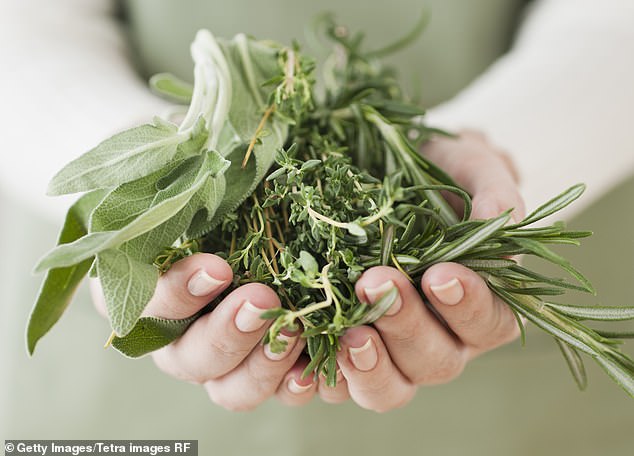Could sprinkling cinnamon on your porridge help cut blood pressure? Does adding fresh parsley to your salad count as one of your five-a-day?
Emerging research suggests that herbs and spices aren’t just a delicious way to pep up the taste of food – they might also bring a raft of health benefits, from better heart health and blood sugar control, to improving our gut microbiome, the community of microbes that supports our digestion and strengthens our immunity.
Although much of the research into herbs and spices is still in an early stage – and often uses concentrated extracts or large doses you wouldn’t get from a normal meal – there are signs that everyday amounts could give your long-term health a boost.
Take something as simple as oregano. Many of us use it to add interest to a spag bol, but it’s a powerhouse of nutrition.
Gram for gram, it provides more polyphenols – antioxidant compounds thought to cut inflammation, which is linked to serious diseases such as
cancer
– than so-called ‘superfoods’ such as blueberries and cacao.
Humble cloves, peppermint, star anise and celery seed also contain similar quantities.
One recent study found that adults at risk of cardiovascular disease who ate nearly 7 g of mixed herbs and spices (about 3 tsp) daily for four weeks experienced an increase in a group of gut bacteria previously linked to better gut and overall health.
The benefits were thought to be due to the high quantities of polyphenols and fibre in the mix, according to the researchers, writing in The Journal of Nutrition in 2022.

Further analysis from the same study, published in 2023 in The American Journal of Clinical Nutrition, showed that the same dose also reduced systolic blood pressure (the top number in your reading) by about 2mmHg, and diastolic blood pressure (the bottom number in your reading) by 1.5mmHg, after just four weeks.
Small, incremental reductions could, over time, add up to a meaningful improvement in heart health.
While herbs and spices don’t count as one of your five-a-day (as we use them in such small amounts), regular use could be an easy and tasty way to improve your overall health.
So which should you focus on? Here is my guide to the herbs and spices worth trying, backed by the latest evidence.
Cinnamon
This popular spice has been linked to better blood sugar control, especially in people with pre-diabetes or type 2 diabetes.
In a 2024 study
published in The American Journal of Clinical Nutrition
, people with pre-diabetes who consumed 4g of cinnamon (about 1½ tsp) daily for four weeks had better blood sugar control throughout the day.
These findings echoed those from a major review of 35 studies published in 2022 in the journal Critical Reviews in Food Science and Nutrition, which showed that cinnamon modestly lowered blood sugar and improved cholesterol levels in people with type 2 diabetes or metabolic syndrome.
Regularly eating cinnamon may help a little, but it’s what the rest of your diet looks like that really matters for blood sugar control if you have pre-diabetes or type 2 diabetes.
One thing to note – most cinnamon in shops is the cassia type, which contains a compound, coumarin, that can be harmful in large amounts.
Ceylon cinnamon (usually labelled as ‘Ceylon’ or ‘true cinnamon’) is a safer option if you’re using it regularly.
Turmeric
A golden-hued spice often used in curries and lattes, turmeric has long been celebrated for its potential health properties – a few studies show its active compound, curcumin, could be a powerful anti-inflammatory and antioxidant.
For example, a major review of previous studies, published in 2024 in the journal Prostaglandins and Other Lipid Mediators, found that curcumin significantly lowered markers of inflammation, such as C-reactive protein in people (with an existing health condition) taking supplements containing on average 8g of curcumin a day, compared to people not taking the spice.
Because curcumin is poorly absorbed, supplements often combine it with piperine, a compound found in black pepper that can increase curcumin’s absorption by up to 2,000 per cent.
Regularly cooking with a few teaspoons of turmeric – ideally with a good grind of black pepper – could still have long-term incremental benefits.
Ginger
The compounds that give ginger its kick – gingerols and shogaols – have been shown to affect several processes in the body, including those involved in inflammation, nausea and how our immune system responds.
One of the best-known uses for ginger is easing nausea, and research backs this up. Clinical trials have found that ginger supplements can reduce nausea linked to pregnancy, chemotherapy and recovery after surgery.
In a 2024 study in the Journal of the Academy of Nutrition and Dietetics, people going through chemotherapy who consumed 1.2g (around ½ tsp) of dried ginger a day reported less nausea and vomiting and lower levels of fatigue, compared to those who took a placebo.
If you’re cooking with fresh ginger, there’s no need to peel it, just rinse and grate it as usual.
Or add a teaspoon of dried ginger to your morning yoghurt. You can also freeze root ginger – this makes it easier to grate.
Peppermint
With a strong, intense flavour and high levels of menthol, the compound in this specific type of mint is thought to give it gut-soothing properties.
Peppermint oil is one of the most researched natural remedies for irritable bowel syndrome (IBS), and it seems to work in a few helpful ways.
Its main active ingredient, menthol, helps relax the muscles in the gut wall, which can ease cramping, bloating and pain. It acts like a natural antispasmodic, calming the overactive gut contractions often seen in IBS.
People with IBS who took peppermint oil capsules were twice as likely to feel better and had less pain than those who took dummy capsules, according to 2019 research published in the journal BMC Complementary and Alternative Medicine.
A cup of peppermint tea might offer gentle comfort, but it’s the concentrated oil (found in most pharmacies) that has shown the strongest benefits.
Cloves
Best known for their use in spiced bakes and mulled wine, cloves also have a long history as a natural remedy for toothache.
Whole cloves were traditionally chewed to ease tooth pain – a practice that now seems to be backed by modern research.
A 2006 trial published in the Journal of Dentistry found that clove gel was just as effective as 20 per cent benzocaine (a common numbing gel) at reducing pain from a dentist’s needle.
The effect is thanks to eugenol, a compound in cloves that acts like a natural painkiller by blocking nerve signals.
So if you are suddenly hit with toothache and are unable to get to a dentist or pharmacy, chewing on a clove may provide short-term relief, though it can cause irritation for some.
Rosemary
Originating from the Mediterranean, this herb may give your brain a lift.
Men who took 1g of rosemary extract daily for four weeks showed improvements in mood, energy and mental sharpness, according to one study, published in 2020 in the journal Nutrients.
While that dose is unachievable when cooking with fresh or dried rosemary, it doesn’t mean the herb isn’t worth adding. Finely chop rosemary and coat vegetables before roasting, or rub onto chicken or lamb with garlic and olive oil. Delicious!
Read more













